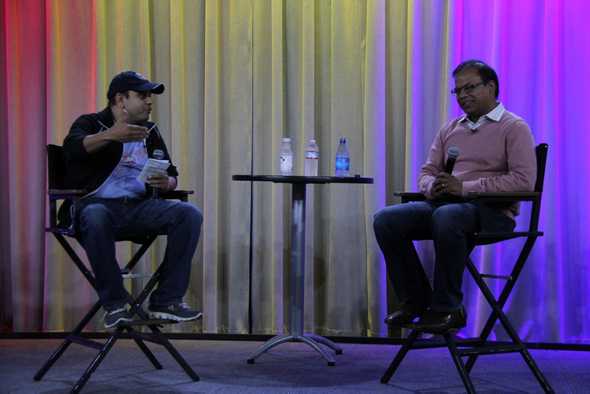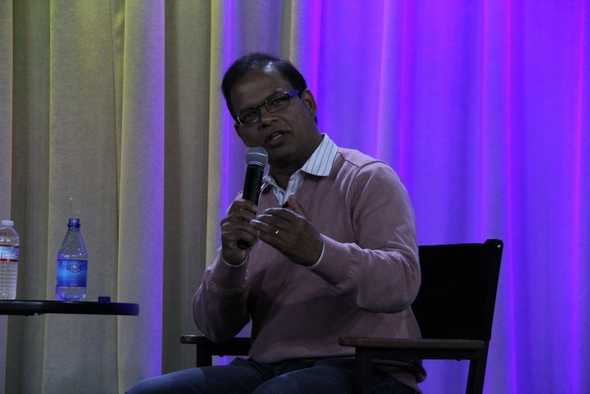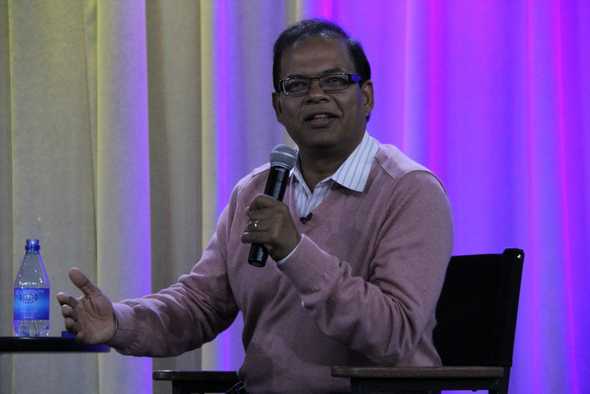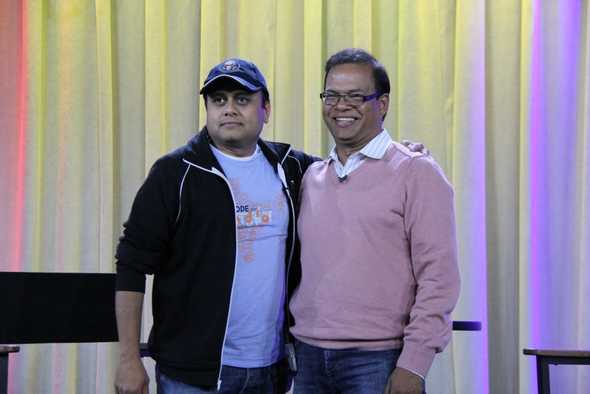Code for India interview with Google's Amit Singhal
At the beginning of the Code for India hackathon last weekend, Karl Mehta, Founder of Code for India, interviewed Amit Singhal. Singhal is Senior Vice President of Google overseeing Google Search. He has worked in search for over twenty years and has been an academic researcher. At Google he leads the effort to build a more natural search system that understands exactly what you mean and gives you exactly what you need. Prior to him joining Google in 2000, he was a senior member of the technical staff at AT&T Labs. Singhal received a Bachelor of Engineering degree in Computer Science from IIT Roorkee in 1989, an M.S. degree from University of Minnesota Duluth in 1991, and a Ph. D from Cornell University in 1996.
Signhal started by saying that we are all meant to do something meaningful in life. The work we do can contribute to a better world.
He was born in Uttar Pradesh, India. Growing up in the 70s, there wasn’t much technology. When his father bought their first black and white television there were only two programs available, one for farmers, and reruns of Star Trek. He was fascinated with a world where you could fly to planets, talk to computers, and get whatever information you needed. He never envisioned it would be something that is today called search.
He ultimately fell in love with the notion that you could search for anything, that you could find anything you wanted. When he was at AT&T Labs, he was invited to join Google. He didn’t like reading programs, he wanted to write code. He started writing a new search system, which became Google’s search system.
Singhal said search could be improved, that it is just getting started. After 23 years of working on search, Singhal goes into work still excited. Search takes too much work. He said you have to pull out your phone, unlock it, and type something on a keyboard that is too small for fat fingers. It is painful to search. The search of the future is where all this goes away. Technology should simply fade into the background and work for you. He showed a video where the user searched using their voice and received small bits of information quickly and visually on the phone, or verbally spoken.
He said he should be able to find anything he needs, anytime he needs, without having to fiddle with phones, passwords, etc. Search will be in all places. With this technology, farmers in India could have more information than before and that it could be transformative.
One day Signhal and Sergey Brin were talking. Sergey told Singhal “you know, we should all do something for someone who would never repay us.” That stuck with Singhal. The company has challenged everyone not just to be better engineers, or better product managers, but to be better people. Google still does things that would be considered abnormal in other companies.
With Google Giving, 5,000 Googlers have donated 60,000 hours of their personal time to over 400 projects which helped kids, pets, and others who were less fortunate. It isn’t just about building things that advance humanity, but to use our time to help those less fortunate. We should remember that we are very fortunate to be what we are.
Mehta said Code for India meets at Google’s office every Saturday and code for non-profits. Their desire is that the code from these open source projects can be used to solve problems in other countries.
Singhal has learned that openness is the key, that code written should be available to anyone. Open source and open access to information is the foundation of progress. Google is a company built upon the open web. Big companies, like Google, rely on open source code, such as OpenSSL, Eclipse, and Python. Huge things have happened because people have written code and donated it to the world. Google supports open source projects like Dart, Go, and Android. He said that the impact of openness goes beyond one person, one team, one company, one country.
He was asked about tips for the hackathon. When he joined Google, he was exposed to code reviews. When writing code that will be used in the real world, it needs to be more robust. After he wrote a search rank algorithm and had it code reviewed, he says he felt as if he didn’t know how to write code. Code reviews instill discipline and bring humility, which he says made him better. He pointed out that the process of finding bugs always makes us better coders.
Mehta asked Singhal if he had a time machine, what advice would he give the 20-year-old version of himself?
Singhal joked: to work out everyday and to eat carefully.
He changed the question to what he wouldn’t change. All his life he has practiced one simple thought. Take a decision that your heart says, follow that path, and never look back. For example, back in 1991, he was working at a company in Minneapolis. He was on a path to get his green card. However, he was accepted to Cornell University to get his Ph. D. His heart told him to go to Cornell and forget about the green card. In 1996, everyone was creating companies out of grad school. He really wanted to do research and publish papers. He ended up at Bell Labs (now AT&T Labs), instead of going to a startup. Others may have chosen the startup experience for the potential upside. But his heart felt different. He never looked back. He went to bed happy every evening.
When Google became an option, he could have been a university professor. At that time, his heart said he wanted to build something. He wanted to practice what he had preached for nearly a decade. He moved from New Jersey and joined Google, taking a big risk. He had a family. He has always followed his passion and never looked back. He said happiness is worth more than any amount of money.




